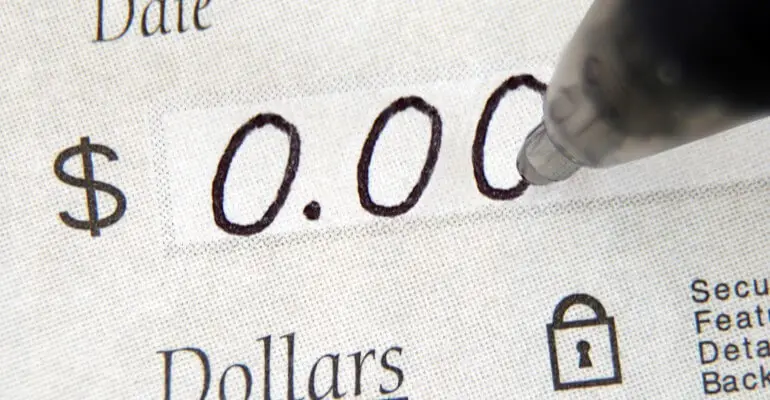My Employer Didn’t Pay Me – What Can I Do?

“My employer didn’t pay me. What can I do?”
Honestly, it’s not a surprise. Even though there are federal and state laws that require companies to pay their employees fair wages – and all wages they are legally owed – they still don’t always do because they think they can get away with it.
But – you are not helpless in this situation. When you’ve been wondering,
“My boss didn’t pay me. What can I do?” the unpaid wages lawyers at Wenzel Fenton Cabassa, P.A. can help.
Unpaid Wage Laws in Florida
Strong unpaid wage laws serve to protect employees from employers who want to pad their bottom line by not paying their employees everything they are rightfully owed. Florida workers are covered by both federal and state laws. This includes:
Equal Pay Act (EPA)— The EPA was signed into law in 1963 by President John F. Kennedy, requiring that an employer cannot pay employees more – or less based on sex. This includes salary and wages, as well as all other types of compensation, including health insurance, 401K benefits, etc.
Fair Labor Standards Act (FLSA) — The FLSA established a federal minimum wage standard in 1938. This includes separate minimums for hourly and tipped employees. The FLSA has broad-reaching mandates, including requirements for overtime and other types of unpaid wages.
Florida Minimum Wage Act — Florida’s state minimum wage law also protects employees, and since it is higher than the current federal minimum wage, it supersedes federal law in minimum wage complaints. The current hourly minimum pay in Florida is $10/hour, rising to $11/hour in September 2022.
Migrant and Seasonal Agricultural Worker Protection Act (MSPA) — The MSPA helps workers by setting standards for wages and requires employers of seasonal and migrant farm workers to notify workers of wages before they are hired.
Examples of Unpaid Wage Violations in Florida
When workers come to our office and say, “My employer didn’t pay me,” it could be for several reasons. There are multiple types of unpaid wage violations that a company may commit. Here are some examples of unpaid wage violations in Florida:
- Not paying an employee the legal minimum wage
- Making an employee perform work “off the clock”
- Not paying an employee overtime pay for hours worked after the maximum full-time (More than 40 hours per week by federal law)
- Not giving an employee their last paycheck after leaving the job
- Not paying an employee the bonuses and commissions they earned
- Not paying an employee for travel time related to their job
- Not paying an employee earned, accrued vacation time
- Not paying an employee the tips they have earned
As you can see, employers can take advantage of their employees in many different ways, violating labor laws and denying them what they rightfully deserve. You may qualify for one or more of the above types of unpaid wage violations.
If your employer has violated your employee rights, labor laws are on your side.
What Can I Do If My Employer Doesn’t Pay Me?
When asking the question, “My employer didn’t pay me, what can I do?” the basic answer is many things. One of the best things you can do is to consult with a wage disputes attorney to determine if you do have a case. Unpaid wages can really add up over time, and if you have multiple areas covered in your case, such as unpaid overtime and unpaid bonuses or commissions, it is not only very significant, but it is also complex.
You should also collect as much documentation as possible related to your claim of unpaid wages. This can include things like pay stubs, work schedules, time sheets, human resource documents, employment contracts, etc.
Unpaid wages lawyers will advocate for your rights under the applicable unpaid wages laws to help you get your missing wages and fair pay. One of the most common ways to do this is to file a claim with the U.S. Department of Labor’s Wage and Hour Division. This is the division of the DOL that administers labor laws and handles unpaid wage cases.
How Long Do I Have to File A Claim?
The statutes of limitations will vary depending on the type of unpaid wages claim. Under Florida law, an employee has four years to file a lawsuit if the employer fails to pay the minimum wage. If the violation was willful, you have up to five years to file your claim or lawsuit.
Under the FLSA, the standard statute of limitations is, generally, two years for the recovery of unpaid overtime. However, if you can establish that there were willful violations, the statute of limitations increases to three years. Due to the complexity of unpaid wages law and the various statutes of limitations, it is important to discuss your case with an attorney.
Once the claim is filed, your attorney can help you recover what you are entitled to under state and federal law. This may include:
- Overtime – 1 ½ time regular pay past 40 hours worked per week (including some salaried positions)
- Back wages, commissions, bonuses, tips, and unpaid vacation time
- Liquidated damages that double the amount you are owed (a penalty for employers who violate employment laws such as the FLSA). Example: If you are owed $7,500, the liquidated damages would bring the total you are owed to $15,000.
When to Contact a Wage Disputes Attorney
Do not delay. If you have been worried, stressed, and asking yourself, “My employer didn’t pay me, what can I do?” it is time to take action now. You deserve compensation for your hours of hard work.
At Wenzel Fenton Cabassa, P.A., we stand up for the rights of our clients against the unlawful acts of employers who line their pockets with their employees’ hard work. We have extensive legal experience advocating for employees in multiple areas of employee rights and have a deep appreciation for the complex and difficult legal nature of unpaid wages. We provide services in multiple locations across the state, including Tampa, West Palm Beach, St. Petersburg, Sarasota, Orlando, Jacksonville, and Miami.
Contact us today to schedule a free, confidential case evaluation.
Please Note: At the time this article was written, the information contained within it was current based on the prevailing law at the time. Laws and precedents are subject to change, so this information may not be up to date. Always speak with a law firm regarding any legal situation to get the most current information available.
Related Posts
Recent Posts
- False Claims Act Retaliation & Your Rights
- Fired for Being Pregnant? 5 Situations When You Should Call an Employment Lawyer
- Can My Boss Take My Tips? The Laws of Tip Ownership
- What Does “Meets FCRA Requirements” Mean?
- Can Your Employer Contact You While on Medical Leave? Know Your FMLA Rights in Florida
Contact Us

FREE HELP GUIDES
Dealing with unpaid wages, discrimination or wrongful termination? Get the information you need to protect your workplace rights. We offer employment law resources to help you fight for workplace justice.


